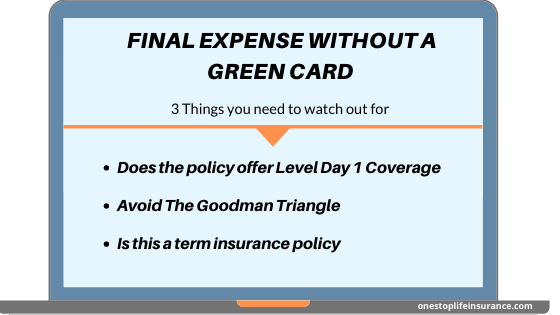Final expense without a green card
Life insurance is an essential part of anyone’s financial plan. It provides you with peace of mind that your family would be able to say their goodbyes properly, not worrying about how to pay for your funeral. There is a special plan, designed to cover your burial cost. However, not every company would offer you final expense coverage without a green card.
In this guide, we would want to reassure you that you ARE able to have a plan in place. We would list the requirements and answer 11 of the most common questions we’ve received.
If you have a specific question we are covering or want us to provide you with your personalized options, simply reach out to us. You can do so by filling out the instant quote form on the page or give us a call.
Here’s what we’ll cover
- What is final expense and why do you need it
- Why does residency status matter
- Am I eligible
- Can I name a foreign national as a beneficiary
- How would my family receive the money
- Are there any restrictions on what they can use the money
- What if my family needs more coverage
- When can a policy NOT payout
- Is there anything I need to watch out for
- I have an existing policy – is this for me
- What if I don’t qualify
Our main focus is to provide you with the tools and knowledge you need to make the best decision for you and your family. We would give you brief and to the point answers to the questions above.

Ok, let’s dive in…
What is final expense and why do you need it
Final expense insurance, or as it is also known as burial insurance, is designed to cover your funeral cost should you pass away. It is a simple and straightforward product if set up correctly (we will explain what we mean by that later in the post).
Typically, this type of insurance is offered with no medical exam and the coverage amount is limited to around $30,000. The application is easy and you can complete it over the phone. The key benefit of this plan is that it ensures that your family would worry about the most important thing should you pass away: saying goodbye. They would not have to “pass the hat”, set up a car-wash, or Go Fund me account to pay for your funeral.
They would have the ability to grieve and not stress financially.

This is a good time to mention that you need to decide and inform your family if you want to be buried or cremated in the US, or you prefer to have your remains sent to your homeland. While the topic could be unpleasant, communication is key and ensures everyone is on the same page.
Why does residency status matter
Every company has its own set of requirements when reviewing one’s application. They are able to calculate and attempt to predict risk, by using a set of actuarial tables. In a nutshell, each company has an image of their ideal or target customer, and citizenship is one of the pieces in the underwriting puzzle.
Some companies require you to be a permanent resident or a US citizen. Others would even take it a step further and require you to be in the US for a minimum of 2 years, even if you have a permanent residence status. With that being said, many would not approve a final expense without a green card.
We were approached by several families looking into setting up a life insurance policy as a part of their Parole in Place application. They were previously turned down by other carriers due to their immigration status.
It is important to work with an agency that specializes in life insurance for foreign nationals. We have years of experience and can help you navigate the world of insurance.
Am I eligible to secure final expense without a green card
Since now you have a better understanding of what is final expense coverage and how it relates to non-permanent residents, it is time to turn our attention to eligibility. In this section, we would touch on some of the basic requirements to secure burial insurance.
Be in the US
There are no exceptions to this rule. In order for you to secure a policy, you need to be in the US. In addition, you need to have financial ties to the country. Simply put, you need to answer why a life insurance policy in the US makes sense. You can not come here for the sole purpose of securing a life insurance policy.
Have a Social Security Number or an ITIN
In order to apply for a traditional policy, you need to have a valid SSN or ITIN*. Companies use it as a form of verification. We’ve created a separate guide on life insurance with ITIN.
*ITIN stands for Individual Tax Identification Number. The IRS issues it, and typically the application process is fairly simple.
Have a US bank account
Companies require the payments to be made out of a US bank account. In many instances, if you are paying monthly, they will automatically draft the premium.
Please keep in mind that some carriers require the account to be active for more than 90 days.
What is your age, health, and lifestyle
These are additional parts of the underwriting process. As we mentioned above, carriers have a set of rules they are considering when reviewing your application. Some have age requirements and would postpone your application if you had a recent heart attack for example.
These are just some of the things carriers would look into when receiving your application. For a complete list of eligibility markers and steps to apply for coverage, visit our guide on final expenses for foreign nationals.
Can I name a foreign national as a beneficiary
Yes, you can list a foreign national as a beneficiary on your life insurance policy. In fact, it is very common to do so. We’ve outlined a separate guide on the topic, going over what are the requirements and what is the biggest thing carriers are considering when approving a foreign national as a beneficiary on life insurance.
How would my family receive the money
We believe this is one of the most important questions on everyone’s mind. You want to ensure that your family would be able to collect the benefit should you pass away and they would not have to jump through any hoops to do so.
Here is a quick overview of the claim process. Keep in mind that every company is different, however, they fall within these general guidelines.
Should you pass away, the beneficiary needs to reach out to the company and file a claim. In other words, he or she needs to advise the life insurance company that you’ve passed away. Afterward, the carrier would send out (typically by mail) the claim form and outline the documents they need to process the claim. On average, there is a short claim form and the beneficiary needs to provide the carrier with the death certificate and a copy of their ID. After all of the forms are received back from the life insurance company and are in good order, the company would mail out the check.
Things you can do to ensure that the process is as fast and easy as possible for your family:
- Please advise them that you have purchased a life insurance policy
- Provide them with the name of the company, the policy number, and the phone number
- Advice them where they can find a copy of the actual policy
- Give them your agent’s contact information

While these seem simple and logical, you would be surprised how often they are being overlooked. We’ve received many calls from family members not knowing what to do. The last thing you want is your family to be unaware that you have a policy in place and not to know who to call, and what the next step should be.
Are there any restrictions on what they can use the money
No, there aren’t. Your beneficiary could use the money for whatever they need. In most instances, they would cover your final expense cost and any outstanding debt and/or medical bills. If there is anything left over, they can use it for whatever they seem fit. Companies do not have any restrictions on how the money is spent.
What if my family needs more coverage
As we mentioned, typically the options available for a final expense without a green card are limited to $30,000. Naturally, you might tell yourself that this is not enough coverage, and should you pass away your family would need more than that.
In this scenario, your options would be based on how much coverage you want. We’ve created a separate guide outlining how to secure life insurance without a green card.
When can a policy NOT payout
It is important to pay attention to any exclusions listed on your policy. While every company is different, there is a common trend when it comes to exclusions. Our advice is to review your policy carefully as soon as you receive your policy.
By law, you have something called a Free Look Period. During this time, you can review your life insurance policy and if you do not want to keep it for any reason, you have the option to cancel it and receive all of your money back. The free look period is 10,20 or 30 days based on the state. Typically, it is no less than 10 and no more than 30 days.
The most common scenario when a policy may not pay out is should you pass away in the first 2 years of the policy. During this time, as known as the contestability period, the company has the right to “go back” and review your application.
- They want to ensure that there were no misrepresentations or information you’ve omitted on the application. This is why it is crucial, to be honest, and upfront with the company. You want to ensure that they have all of the information to approve your policy and that your family would receive the money they need.
- Another common exclusion is suicide committed during the first 2 years of the policy.
- Illegal activity -This is another example of exclusion that may be added to your policy. Simply put, a life insurance company would not pay out the death benefit if you died while involved in illegal activity.
- Act of war – Some life insurance companies have this exclusion. It means that if you die as a result of war, the insurance company may pay out the death benefit.

As we suggested, take the time to review your policy before you file it away. You want to go over the page with the exclusion and also ensure that the names of the beneficiaries are spelled correctly.
Is there anything I need to watch out for when setting up final expense without a green card
Do you remember when we said final expense is a straight forward product if set up correctly? In this section, we would list the scenarios you need to be aware of when securing this policy, or any life insurance policy for that matter:

Does this policy offer day 1 coverage or it has graded benefit?
This is an important question. To understand the big difference, keep in mind that day 1 coverage is just that. The policy would offer you coverage on the very same day it goes into effect. In other words, should you pass away a day later, the policy would pay out the full benefit.
Graded benefit, on the other hand, is structured a bit differently. There are several policy structures out there.
Here is an example of one:
- Should you pass away during the 1st policy year, your beneficiary would receive 110% of the premiums paid. In other words, they will receive the money-back plus 10% interest.
- Should you pass away during the second year of the policy, your beneficiary would receive 20 % of the death benefit.
Let’s say, you opted for a $20,000 burial insurance, your beneficiary would receive $4,000 ($20,000×20%).
*Typically, companies would payout 100% of the death benefit, if the death is a result of an accident, even if it’s during the first 2 policy years.
Of course, there are many different variations of a policy structure. However, the takeaway is to take the time to understand the difference and know exactly what plan you have.
Avoid the “the Goodman triangle”
Life insurance is designed to receive a favorable tax treatment. In other words, the beneficiary would not have to pay income taxes on the benefit they receive. However, there is a scenario that this would not apply. It is referred to as the Goodman triangle, and you should avoid it, if possible. The best way to explain it is through an example:
Let’s supposed, you are the insured. Your daughter wants to purchase a life insurance policy on you and name her son (your grandson), as a beneficiary. In an essence, there are 3 parties to this contract:
- You as the insured
- Your daughter as the owner
- Your grandson is the beneficiary.
According to the current tax provision, any benefit he would receive from the policy would be considered as a gift from his mother and be subject to taxation.
Solution:
The best way to avoid this situation is to only have 2 sides of the triangle. For example, you are the owner and insured of the policy and your grandson is the beneficiary.
Is this a term insurance policy
We have been a strong advocate that there is not one policy option (term or permanent insurance) that is always better and everyone should have the same policy type. We believe that your policy needs to address your needs.
However, the last thing you want is to cover a permanent need, such as a final expense, with temporary protection. In other words, you want to make sure your burial insurance coverage would be in place even if you die at age 90 or beyond. You do not want to have an expiration date that you need to die before, in order for the policy to payout.
When researching your options, make sure you know what type of policy you are securing. We recommend a permanent policy, however, there are these instances when term insurance may be the only option or may make more sense.
It is important to know what plan you have to avoid any unpleasant surprises down the line.
I have an existing policy – is this for me
This is a common and valid question we receive. The answer is it depends. What does your current policy look like? Would it expire soon, does it have many exclusions? How is your current health? In other words, do you need new insurance or are you considering a replacement? Every time you have an existing policy, you need to make sure if it still addresses your needs, if not is a replacement in your best interest.
If you are considering replacing your existing insurance, there are several things that we need to consider. First off, is a replacement in your favor, and secondly does the company allow replacements.
There are life insurance contracts that are not designed to replace your current life insurance policy and ask you specifically on the application if you are considering replacing the current converge.
We would advise you to reach out to us and let us review your existing situation. We will take a look and advise you if it’s best to keep your existing policy, change it, add to it, or replace it altogether.
What if I don’t qualify
If you are not able to qualify for this final expense, due to your immigration status or any other reason, rest assured we still may have an option for you. We are able to contract with a company and allow foreign nationals to secure the coverage they need. The plan has zero health or lifestyle questions. We’ve created a separate guide outlining the policy structure, states where it is available, and the cost. Feel free to review our guaranteed issue life insurance post.
In conclusion,
We wanted to create this guide and outline that you can secure the final expense without a green card. Even though not every company would consider coverage, there are options.
We hope you find this helpful. Feel free to reach out to us if you have any questions or would like us to provide you with a custom insurance plan.
Thank you!
